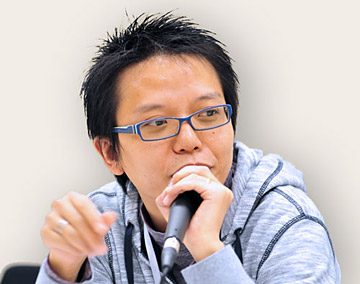We regret the passing, on April 11, 2024, of the distinguished Romanian author and critic Dan Cristea, who served as the editor in chief of the Luceafărul de Dimineață cultural monthly. In addition to being an alum of the 1985 Fall Residency, Cristea received his PhD in Comparative Literature at the University of Iowa.

Hu Xudong 胡续冬 (1974-2021), (IWP ’08). Chinese poet, critic, essayist and translator. Born in Chongqing, lives now in Beijing. M.A. in Comparative Literature and Ph.D. in Chinese Contemporary Literature from Peking University, where he now is as an associate professor at the Institute of World Literature. He has published 7 books of poetry (From Water’s Edge, Juice of the Wind, Amor en los Tiempos del SARS, What Time Is It There?, The Strength of the Calendar, The Eternal Inside Man, Travel/Writing), 3 books of essays (Random Words of A Random Life, the Hidden Passion in Brazil, Random Thought after Random Eating), as well as a number of translations. He is the recipient of the Liu Li’an Poetry Award, the Rougang Poetry Award, the Tomorro- Ergun Poetry Award, and the Top 10 New Poets Award, among others, with work translated into English, Spanish, German, Portuguese and Japanese.
Literary/personal:
Q: How, and where, is your work going right now?
HX: After I came back from IWP in 2008, four new books of mine were published in China--two of poetry, two of essays. Of course, all of them were written in Chinese. More poems of mine were translated into German, Spanish, English and Japanese during these 3 years, but I still don't have a complete book translated into a foreign language.
Q: What book(s) are under your bed? What films or TV programs have influenced you lately?
HX: Among the books I have been reading before falling asleep: Roberto Bolaño's 2666, Junot Diaz's The Brief Wondrous Life of Oscar Wao, Chuck Palahniuk's Haunted and Carlos Drummond de Andrade's O Amor Natural. I'm translating this last one from Portuguese to Chinese.
HX: I watch movies very often, seeing 4-5 films per week. Recently I liked Chonmage Purin (Yoshihiro Nakamura), The Borrower Arrietty (Hiromasa Yonebayashi), A Sad Trumpet Ballad (Álex de la Iglesia), Biutiful (Alejandro González Iñárritu), Source Code (Duncan Jones), Le Concert (Radu Mihaileanu), Tropa de Elite 2 (José Padilha), L'illusionniste (Sylvain Chomet), Spring Fever (Lou Ye), and Poetry (Lee Chang-Dong).
Q: Is there a book or an author you re-read for intellectual company?
HX: Fernando Pessoa, for his poetry teaches us what the authentic 'Supreme Fiction' is; Zbigniew Herbert, for among his lines there is an other European Union; Youyang Miscellanies, by Duan Chengshi, a Chinese writer of Tang dynasty -- a splendid resource of literary imagination.
Literary/generic:
Q: What writers, or work, do you think should be getting more attention and translation? Where is the most movement in the Chinese-language literary scene right now?
HX: Poet Zangdi from Beijing and novelist Zhang Dachun (Chang Ta-ch'un) from Taipei should be translated more into other languages. Zangdi's writing is a great synthesis of western high-modernism and the flexibility of contemporary Chinese language. Zhang Dachun's novels will give western readers a lesson about how cunning an oriental narration can be. Most of the Chinese-language literary scene now takes place on the internet, although the geographical center of Chinese literature is still the immortal monster, Beijing.
Q: In your view, do literary festivals and awards open up new directions? If yes, which ones do you pay attention to? And are there literary journals you follow?
HX: For me, literary festivals and awards are specific ways of getting information. I don't think they can open up new directions -- I even doubt there is such a thing as 'direction'. Festivals and awards just show us which way the literary field runs. I do pay attention to some important literary awards, though, like the Nobel Prize, Premio Cervantes, Premio Camões, the Booker Prize, the Pulitzer Prize, Prix Goncourt, the Neustadt Prize, etc. I follow very few literary journals.
Q: How do you feel about creative writing as a university-level/academic discipline?
HX: It's a paradox. One of the functions of creative writing as an academic discipline is to improve the literary environment, but sometimes "good literature" itself contains something that goes against any smooth environment. However, I still think creative writing as an academic discipline is helpful— if nothing else, it gives jobs to many writers.
General/politics
Q: What pressing political issues in your part of the world should be given more attention?
HX: The train crash that happened in July and the unwise response to it by the government evoke immense rage on Chinese websites. Many people think that the high-speed but unsafe train is a metaphor of the actual China.
Q: What role should the state have with respect to culture and the arts?
HX: Let culture and the arts circulate in their own orbit. When they are imperiled by the power of commerce, give them some financial support without any intervention in their "direction."
Q: In which (geopolitical) direction do you expect to be looking 10 years from now for major cultural changes?
HX: I expect that in 10 years the western world might know more about Chinese literature.
Find Us Online